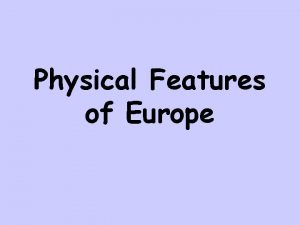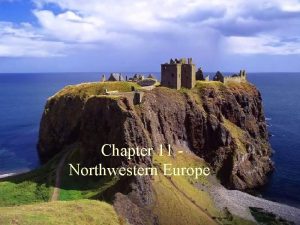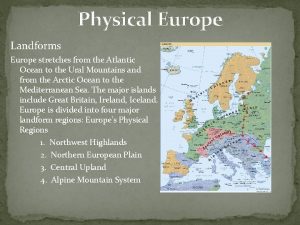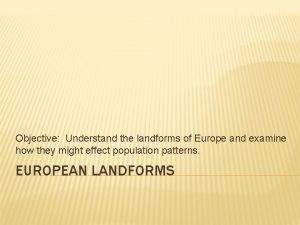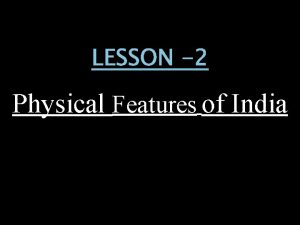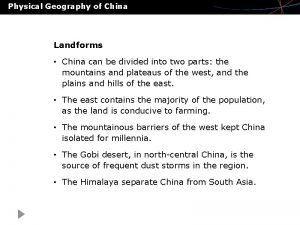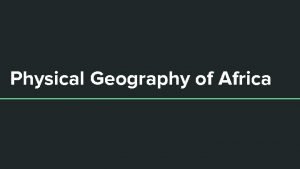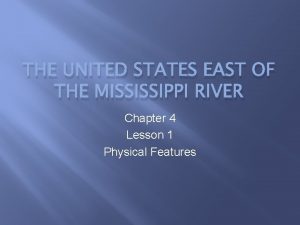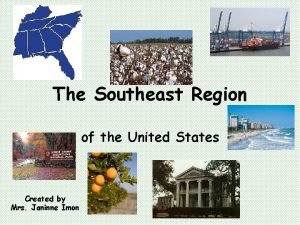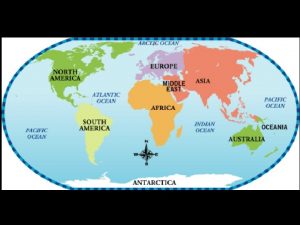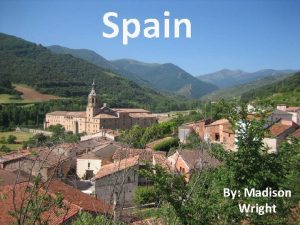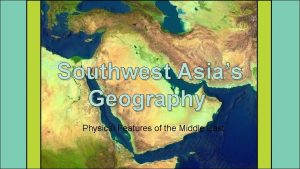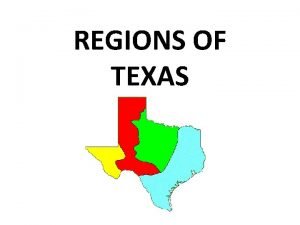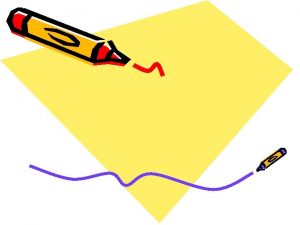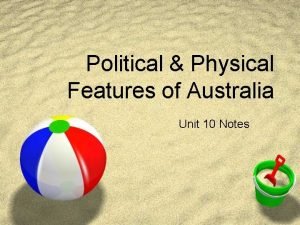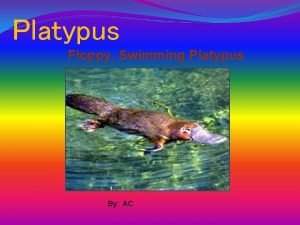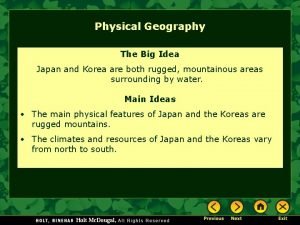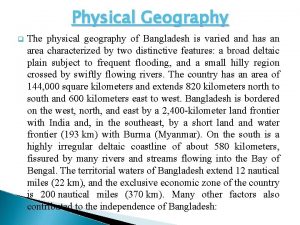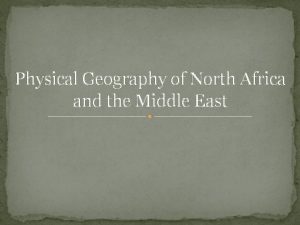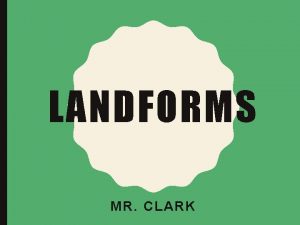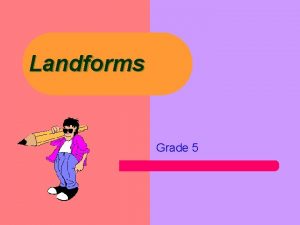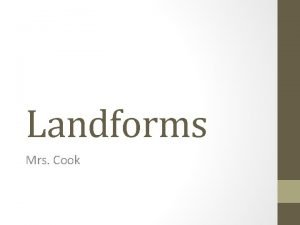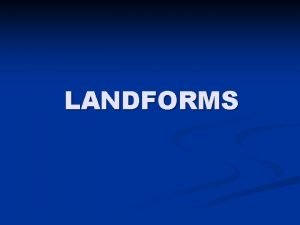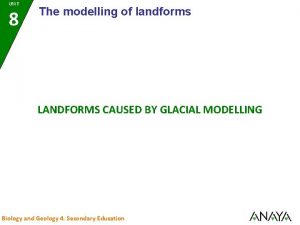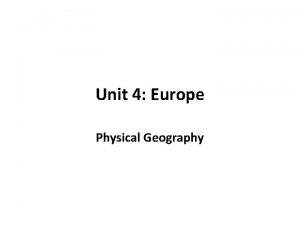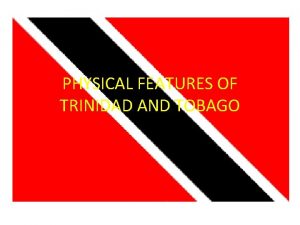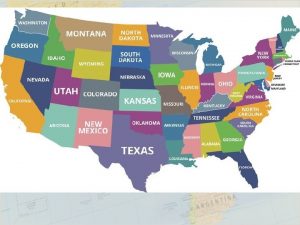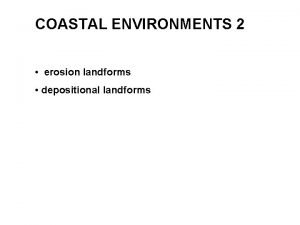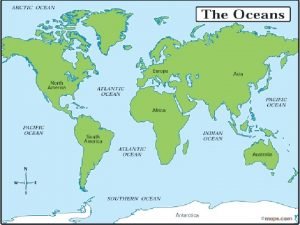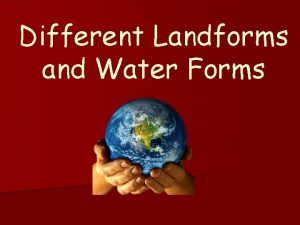Unit 4 Europe Introduction Physical Features Landforms Europe























- Slides: 23

Unit 4 Europe Introduction

Physical Features

Landforms Europe stretches from the Atlantic Ocean to the Ural Mts. And from the Arctic Ocean to the Mediterranean Sea. Islands Great Britain Ireland Iceland

Peninsulas Scandinavian Iberian Italian Balkan





Four Major Landform Regions Northwest Highlands Northern European Plain Central Uplands Alpine Mountain System

Northwest Highlands Ancient eroded region of rugged hills and low mountains Includes the hills of Ireland England, Scottish Highlands and mountains of Scandinavia, Northwest France, and parts of iberian Peninsula.


Northern European Plain Stretches from Frances Atlantic coast to the Ural Mts. Mostly less than 500 ft above sea level. Many rivers, river towns, and port cities. Europe’s most important farming and industrial area.

Central Uplands Stretches Northeastward across Southern Germany to the Bohemian Highlands. Area of hills and small plateaus, with forested slopes and fertile valleys. Includes Massif Central of France and Jura Mountains. Old eroded region with low, rounded mountains and hills.

Alpine Mountain System Stretch from France’s Mediterranean coast to the Balkan Peninsula. Large, peaked mountains up to 14, 000 feet. Large snowfields and glaciers. Avalanches are common.



Water Europe is nearly surrounded by water. Hundreds of good, natural harbors. Most are located near the mouths of navigable rivers. The Rhine and Danube are Europe’s most important rivers.

Climates Three major climate types Marine West Coast Humid Continental Mediterranean Other smaller climate Tundra Subarctic Humid Subtropical Semiarid

North Atlantic Drift Warm ocean current. Originates off the coast of North America and is fed by tropical waters of the Gulf Stream Western Europe enjoys relatively mild climates compared to the rest of Europe because of the North Atlantic Drift.

Plants and Animals Human activities and pollution have severely affected wildlife. Many animals have become extinct. Some animals only thrive in protected areas.

Natural Resources Most original forests were cleared centuries ago. Causes: Clearing Overgrazing Pollution/Acid Rain Good soils for farming. Lemons Oranges Many different vegetables

Other crops: Grapes Olives Potatoes Wheat

Energy and Minerals Relies heavily on imports Lack sufficient supplies of critical natural resources. Oil, iron and other metals. Oil and natural gas deposits beneath the North Sea.
 Physical feature of europe
Physical feature of europe Northwestern europe countries
Northwestern europe countries Physical geography of northern europe
Physical geography of northern europe Landforms in europe
Landforms in europe Landforms europe
Landforms europe Landforms in southern europe
Landforms in southern europe Physical features of india introduction
Physical features of india introduction China physical landforms
China physical landforms Landforms of africa
Landforms of africa Unit 10, unit 10 review tests, unit 10 general test
Unit 10, unit 10 review tests, unit 10 general test States east of mississippi
States east of mississippi Southeast region physical features
Southeast region physical features Southeast region agriculture
Southeast region agriculture Sub saharan africa physical features
Sub saharan africa physical features What is the relative location of madrid spain
What is the relative location of madrid spain Inlet of indian ocean between africa and asia
Inlet of indian ocean between africa and asia South asia physical features
South asia physical features Physical features in texas
Physical features in texas Physical features of the midwest
Physical features of the midwest Australian physical features
Australian physical features Platypus behavioral adaptations
Platypus behavioral adaptations How are the physical features of japan and korea similar?
How are the physical features of japan and korea similar? Physiography of bangladesh
Physiography of bangladesh Physical features of the middle east map
Physical features of the middle east map
